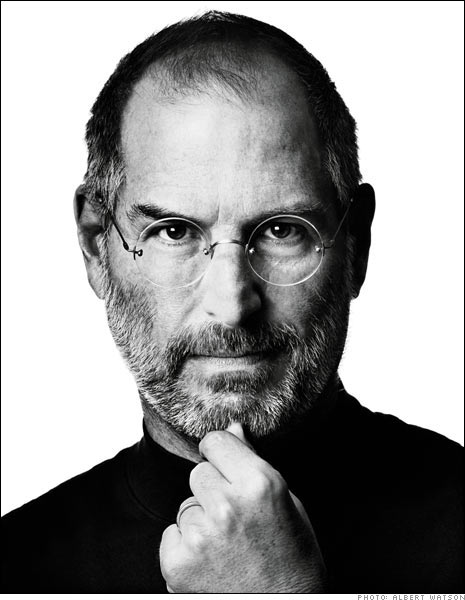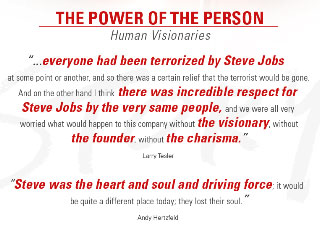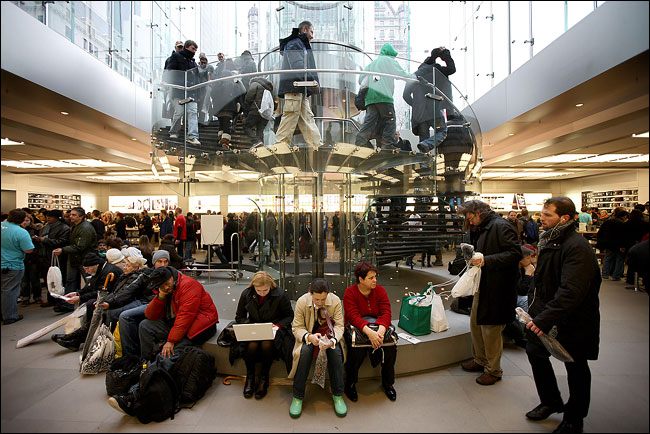
I’ve written about my connection with Steve Jobs several times. Working with him at Apple. Working with him at Next. Working with him at Apple. And my link to him is about looking for ways to tell his story in the context of his brilliant evocation of design and technology.
Now, there are continuing questions about his health — and I, like others, are concerned about him. In a way, it’s intriguing that he’s treated more as an icon and less as a person — a living being. Such is the way with legends. Stories hold. And in the spirit of the human brand, a leadership ethos that continues to espouse a genetic framework behind the offerings of a brand; it’s the person, the personal, the personality that wends its way into the heart of the brand itself. The human brand is the heart of the proposition. There is a lot of concern about him, yet there is love, as well. It’s better to hold there, the idea of concern in reflection of the enormous contribution of leadership he’s offered, with literally mythic levels of energy.
Far more than I. And he’s several years younger…
Anyone Still Remembers Steve Jobs Is Human? Svetlana Gladkova on January 05, 2009, comments:
“Steve Jobs does have health problems but should we forget he is human? Earlier today we have finally received the confirmation that Steve Jobs did have health problems and these health problems are the reason (or at least one of the reasons) for him not to make his traditional keynote at Macworld. But instead of listening to what Mr. Jobs wanted us to hear and what the Board of Directors confirmed, the tech blogosphere instead engaged in a new round of rumors about how bad his health is and when we should expect him to leave the position of Apple CEO; it looked like many reporters either did not want to read the letter Steve Jobs sent to the “Dear Apple Community” explaining his absence from this Macworld event or only saw what they wanted to see: Steve Jobs admitting he does have health problems. At the same time it is evident that it is quite a bitter letter from a person who is tired and who does experience problems with his health but is trying very hard for these problems not to hurt the business of his life and is also not exactly happy about some reporters describing him as being on his deathbed.”
And, I might comment that this is a typical reflection of the brand — and the person that drives it — the sensibility of iconoclastic, even renegade attitude that inhabits the genetic spirit of the culture.
She continues, “So he has made the decision to share very personal information with the community for everyone to be able to relax and enjoy the show beginning tomorrow. But instead he gets into the new flurry of rumors and discussions of how bad his health is and everyone is already discussing what Apple might do without Jobs and who the next CEO will be. As if Steve Jobs has actually died already. And in the letter he actually asked for support from the Apple community in his recovery (that is told not to be very complicated and requires simple treatment) – and instead he received tons of new health rumors again.
To me the imbalance here looks terrible with everyone discussing health of a person as if it only matters in how it influences the company he runs. Apple is still nothing but a company. True, it is a company that also happens to manufacture a number of products that are supposed to be worshipped by many. But it is still a company, a business that is primarily intended to feed some need for people (in this case for cool gadgets and computers) and to make money to its stock holders. But Apple is still nothing but a business (no matter how important it is) and Steve Jobs is still a human being and I can hardly admit there is anything more important or more valuable than a human life.”
I would agree with her sentiments, but I’d offer that it’s no more of a company than is made by the man, the spirited, humanly founded brand whose culture is caught in the swirl of his imaginings. And, importantly, those he attracts. Energy is eternal delight — and energy, or spiritual character founds brands. Without them, they merely become evanescent expressions of commerce.
“Steve Jobs is a very important person for Apple and for all the stock holders as it means billions in market valuation for them. But unfortunately I am more than uncomfortable about Apple community thinking of their leader in terms of Apple stock price. Stock price or no stock price Apple is still a company that is run by many people, not by Steve Jobs on his own. A company that only depends on one person for everything deserves drastic drops in its market valuation if this person leaves as it can not be described as a healthy company at all.”

Good call, Svetlana — and you’re right, it’s surely not about the one, but about the many — and who they follow. Steve evinces that principle in thought and deed. He says so:
“Innovation has nothing to do with how many R&D dollars you have. When Apple came up with the Mac, IBM was spending at least 100 times more on R&D. It’s not about money. It’s about the people you have, how you’re led, and how much you get it.”– Fortune, Nov. 9, 1998
But, to the concluding character of this commentary, what really did happen to the relationship to the brand, and the person — the health of the leadership — in equation to the health of the company? Not much.
Which speaks to some key resolutions noted in the trade — what leadership there is, the longest shadow falls from the top. According to the NYTimes:
some analysts and shareholders say the future remains uncertain for Apple, given the climate, and as well, particularly in light of the absence of Mr. Jobs. Overviewing the scenario in a conference call with analysts, the company’s chief operating officer, Timothy D. Cook, who is filling in for Mr. Jobs during his leave, sought to allay those issues.
“There is extraordinary breadth and depth and tenure among the Apple executive team, and they lead 35,000 employees that I would call wicked smart,” Mr. Cook said. “We believe we were put on the face of the earth to make great products, and that is not changing.”Apple reported strong first-quarter profits that surprised analysts and squarely beat out Wall Street’s expectations. Apple’s quarterly profit jumped to $1.61 billion, or $1.78 a share, from $1.58 billion, or $1.76 a share, a year earlier. Their revenue increased to $10.17 billion, from $7.9 billion. Analysts had expected Apple to announce revenue of $9.74 billion and profit of $1.39 a share. The news sent Apple’s stock up more than 9 percent to $90.70 in after-hours trading.
“Where many of the other consumer-facing companies are missing their expectations and seeing their revenues decline, Apple continues to see growth,” said David Bailey, an analyst at Goldman Sachs in the NYTimes. “It is gaining market share in every category and, given the premium price of their products, that is a significant achievement.”
The earnings report presented a picture that was in disparity with pessimistic speculation about Jobs’s health, and with the company’s declining stock price. Earlier, Apple shares reached a two-year low on concerns that the economy was hurting its prospects, and on anticipatory fears that Mr. Jobs’s absence might become permanent. But, in this instance, it’s the leadership that counts — that drove the legacy, that defined the character of the brand and the attributes of its marketing and product innovation strategies. More so, to the propositions of the power of the human brand, and the leadership that comes from it, Apple said it sold 4.36 million iPhone 3Gs in its holiday quarter, down from 6.9 million phones during the fall quarter, when the 3G version was released — that is nearly double the 2.3 million iPhones that were sold in the year-ago quarter. It had sold 2.5 million Macs, up from 2.3 million in the quarter a year earlier, largely on the strength of its MacBook notebooks, which the company updated in October. Apple is posting those gains at a time when the overall market for personal computers is contracting, along with, it would seem, everything else. IPod continued its leap — sales jumped a healthy 3 percent from a year ago, to 22.7 million, driven largely by consumers in Europe and Asia.
In the spirit of the positioning of the brand, and the persona that the product grouping represents, Apple charges higher margins than many of its competitors because it can charge a premium for devices that consumers view as more glamorous and better designed.

I was talking with some friends, about Apple Store, which I’ve explored elsewhere — and gathering some conceptions into the insights of how they’re designed. “Working with Apple, it’s like they are really asking us only to do precisely what they are after — extraordinary precision; every detail is drawn down the finest level of precision — there’s really no latitude; they’ve got a vision and we don’t deviate from implementing that vision by one centimeter. We’re producers, not designers — we’re just doing exactly what they want us to do”.
Tight, from the top.
TSG | Cupertino